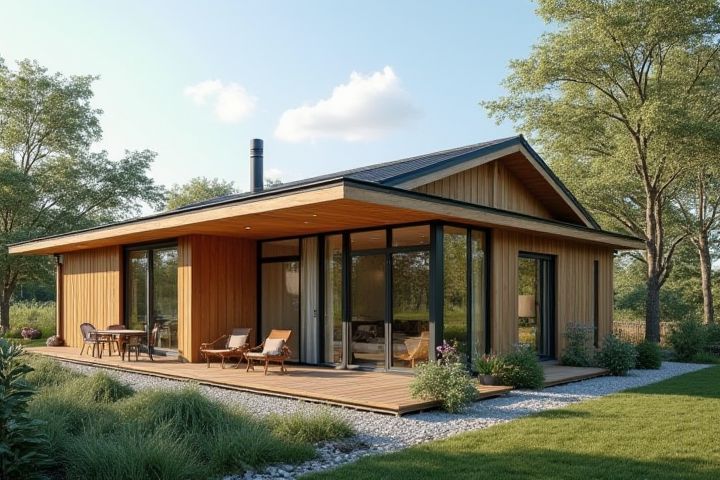
Prefabricated houses offer numerous benefits, such as cost-effectiveness, with lower construction expenses compared to traditional homes. These structures are built in factories and shipped to the site, reducing construction time significantly, which means you can move in sooner. Modern prefabricated designs utilize high-quality materials and sustainable practices, often leading to increased energy efficiency and lower utility bills. Additionally, they come in a variety of styles and customizable options, allowing you to create a home that reflects your personal taste. With their durability and potential for environmental benefits, prefabricated houses can be a smart choice for many prospective homeowners.
Are Prefabricated Houses A Good Idea
Cost-effectiveness
Prefabricated houses typically cost 10% to 20% less to build compared to traditional homes, primarily due to reduced labor expenses and construction time. With predictable pricing structures, you can plan your budget more effectively, avoiding unexpected costs that often arise in conventional building projects. These homes also contribute to sustainability, as they generate less waste during construction, further enhancing their cost-effectiveness. Overall, investing in a prefabricated house can lead to substantial savings while still providing quality and efficiency in the housing market.
Time efficiency
Prefabricated houses significantly enhance time efficiency in the construction process, allowing for rapid assembly and reduced on-site labor. These homes are manufactured in a controlled environment, which minimizes weather-related delays commonly associated with traditional building methods. Once delivered, the modules are quickly pieced together, resulting in a finished product within a fraction of the time compared to conventional construction. If you're considering a home build, opting for a prefabricated option could dramatically expedite your timeline without sacrificing quality.
Quality control
Prefabricated houses undergo rigorous quality control processes, ensuring that each component meets high manufacturing standards before assembly. This controlled environment minimizes defects caused by weather or environment, leading to enhanced durability and structural integrity. Manufacturers often employ advanced technologies and materials, promoting energy efficiency and sustainability throughout the building lifecycle. With meticulous inspections and adherence to building codes, you can trust that a prefabricated house offers reliable quality amidst the modern demand for efficient housing solutions.
Sustainability
Prefabricated houses are an eco-friendly alternative to traditional building methods, reducing construction waste by up to 90% and minimizing the carbon footprint associated with on-site construction. They often utilize sustainable materials, like reclaimed wood and energy-efficient insulation, which can lower energy consumption by as much as 30% compared to conventional homes. With pre-fab manufacturing processes that optimize materials and minimize energy usage, these homes support a greener lifestyle. Choosing a prefabricated house not only contributes to environmental sustainability but also allows you to invest in quality and efficiency.
Design flexibility
Prefabricated houses offer exceptional design flexibility, allowing homeowners to customize layouts and aesthetics to meet individual preferences. With modular construction, you can easily adjust the number of rooms, integrate eco-friendly features, and enhance energy efficiency. Many manufacturers provide a variety of styles and materials, enabling you to choose from contemporary designs to more traditional aesthetics. This adaptability not only streamlines the building process but also enhances the potential for future modifications, ensuring that the home can evolve with your lifestyle and needs.
Energy efficiency
Prefabricated houses are often designed with energy efficiency in mind, utilizing advanced construction techniques that minimize waste and optimize insulation. These homes frequently incorporate sustainable materials and innovative HVAC systems, reducing their overall energy consumption. By streamlining the building process, prefabricated houses can also lower your carbon footprint during construction. Many models qualify for energy-efficient certifications, making them an attractive option for environmentally conscious homeowners.
Durability
Prefabricated houses often feature robust construction methods, utilizing high-quality materials that enhance overall durability. These homes are typically subjected to rigorous quality control processes during manufacturing, ensuring they can withstand various environmental challenges. Many prefabricated designs include advanced insulation and waterproofing techniques, extending the life of the structure and reducing maintenance needs. With a lifespan comparable to traditional homes, prefabricated houses present a resilient housing solution that meets modern durability standards.
Financing options
Prefabricated houses offer several appealing financing options, making them an attractive choice for many homebuyers. Traditional mortgage lenders often treat these modular homes like conventional properties, allowing you to secure financing with competitive interest rates. Some companies even provide their own financing solutions or collaborate with specialized lenders, simplifying the purchase process. You may also benefit from potential cost savings in construction that could reduce your overall loan amount, leading to lower monthly payments.
Resale value
Prefabricated houses typically offer competitive resale value due to their modern construction methods and energy efficiency features, attracting environmentally conscious buyers. Many prospective homeowners appreciate the quicker build times, which streamline their entry into the market. Factors such as location, design appeal, and the quality of materials used can further enhance their desirability and resale potential. You may find that investing in a well-constructed prefabricated home can yield favorable returns in a fluctuating real estate market.
Customization potential
Prefabricated houses offer significant customization potential, allowing homeowners to tailor their living spaces to fit individual needs and preferences. With options ranging from floor plans to finishes, you can create a unique home that reflects your personal style while staying within budget. Many manufacturers now provide modular designs that can be easily reconfigured, offering flexibility as your lifestyle changes over time. The ability to select everything from eco-friendly materials to energy-efficient appliances further enhances the appeal of prefabricated homes, making them an attractive choice for modern living.
